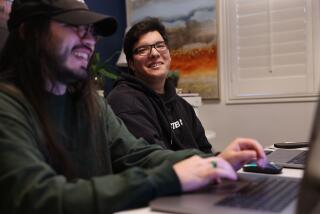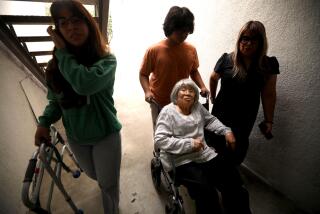Help Is Offered the Hearing-Impaired and Their Families : SHHH is dedicated to the welfare and advocacy of people who want to participate fully in the hearing world.
- Share via
I spent a weekend recently with a friend who seemed to begin every conversation just as I turned my back, left the room or ran the water.
My inability to hear under such conditions and the process of getting her to repeat most everything she said was very frustrating. It was also a window into the world of people with hearing impairments and their families.
Because, indeed, hearing loss, which often occurs later in life, is a family affair.
Robert L. Beck, M. A., covered the problem in his paper, “The Forgotten Family,” presented at the eighth International SHHH (Self Help for Hard of Hearing People) Convention, held last month in San Diego.
According to Beck, hearing loss can have grave social consequences. He outlined predictable reactions that arise from a family member’s retreat and the need for all involved to adjust communication skills.
These issues and other topics ranging from close-captioning in theaters and the use of trained “hearing dogs” to rights under the Americans With Disabilities Act were addressed at the SHHH convention, which was attended by Conejo Valley chapter founder Gerry Christie, 45, and chapter member Marjie Alger, 67.
SHHH is a nonprofit, non-sectarian international volunteer educational organization of people with hearing impairments, and their families and friends. The group is dedicated to the welfare and advocacy of people who do not hear well but who want to participate fully in the hearing world.
Christie and Alger reported on the convention at last month’s meeting of SHHH. The Conejo Valley chapter is open to people of all ages. But Christie said most participants are senior citizens.
I met both women recently at Alger’s home, where they discussed the benefits of SHHH, especially to people who develop hearing loss late in life. And they talked about the electronic devices that have made communication so much easier for both deaf people and those who are hearing-impaired.
Christie has a moderate hearing loss and can read lips. She said that frequently the higher voice range is the most difficult for people to hear. So interacting with young grandchildren is often a problem.
Alger and her husband, Bob, agreed. “Our grandson recently reached adolescence and his voice dropped,” Bob Alger said. “And the first thing Marjie noticed was that she can understand him better.”
Marjie Alger, whose hearing loss has increased during the last 20 years, wears hearing aids in both ears and reads lips with great facility. But comprehension requires that a person always face her and, as she said with a laugh, not have a beard or cookie-duster mustache.
Alger also has a TDD machine, which resembles a digital display calculator with a keyboard. Because she speaks clearly, Alger is still able to speak into the receiver. To receive information, she gets a printed transcription of everything a caller says to her by means of a relay operator system.
“When you lose your hearing, you become more sensitive and can’t tolerate loud sounds,” Alger said. Background noise presents a big problem. So when she is on the phone, her TDD transcription even indicates if there is background noise such as a dog barking.
Alger also carries a tiny, hand-held “pocket-talker” microphone that she can direct at someone in a crowd with whom she is speaking. The attached earphones allow her to filter the conversation.
“When you don’t hear well, it takes more energy to do everything,” Christie said as she watched Alger’s demonstration.
Christie uses an amplifier on the receiver of her telephone at home. And when she goes out, she carries a portable two-inch-square lightweight amplifier that fits over any phone receiver.
Despite hearing loss, both women emphasized that isolation is not the answer. “It is very important not to ‘fake it’ or retreat,” Christie said. “Humor, acceptance and remaining committed to group and social activities is the answer.”
* FYI
MEETINGS: The Conejo Valley chapter of SHHH meets monthly in the Thousand Oaks Public Library, 1401 E. Janss Road. The next meeting will be from 9:30 to noon Sept. 2. A $20 annual membership in SHHH includes a subscription to its bimonthly magazine. For information or the locations of other SHHH chapters in the county, call 493-1955 or 646-0222.
TDD: To obtain a TDD machine or other adaptive equipment free of charge, contact the special needs operator at your local telephone company.
More to Read
Sign up for Essential California
The most important California stories and recommendations in your inbox every morning.
You may occasionally receive promotional content from the Los Angeles Times.













